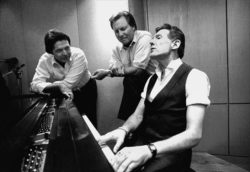Mickey Gilley
Singer Mickey Gilley's top-10 hits placed him among the most successful country music recording artists in the 1970s and 1980s.

Courtesy of Christopher Harris
Jerry Lee Lewis, Mickey Gilley and Jimmy Swaggart. Harris, Christopher (photographer)
Singer Mickey Gilley spent a decade atop the country music charts from the mid-1970s through the mid-1980s amid the arc of a music career that took him from north Louisiana to Texas and eventually to the glitz of Branson, Missouri. He secured a foothold in popular culture, though, as the proprietor of the Houston-area music club Gilley’s, an outsized honky-tonk famed for its mechanical bull and “urban cowboy” mystique.
Gilley was born March 9, 1936, in Natchez, Mississippi, but grew up across the Mississippi River in Ferriday. Gilley often played piano during his childhood with his cousins Jerry Lee Lewis and Jimmy Swaggart. The inseparable trio grew up on gospel and country music and, in defiance of both parents and the local mores, the boogie-woogie sounds they overheard in nearby black neighborhoods.
When he was around ten years old, Gilley’s mother Irene bought him a piano with the money saved from her waitress job. However, pursuing a musical career did not seem realistic for him until Lewis’s meteoric rise to rock ‘n’ roll stardom in 1957. Already married and living in Houston, Gilley decided to follow his cousin’s example. Lewis’s stardom opened some doors for Gilley, but his own success would take years to realize. For his earliest recording sessions, Gilley returned to Louisiana to record for Huey Meaux in New Orleans. Nicknamed the “Crazy Cajun,” Meaux later scored hits for Freddie Fender and the Sir Douglas Quintet, but Gilley’s work attracted no attention. From 1957 to 1958, he performed in Gulf Coast towns, including regular appearances at Ray’s Lounge in Lake Charles.
In 1958 Gilley enjoyed a minor hit, “Call Me Shorty,” for Hollywood, California-based Dot Records. Ten years passed before the release of his first album, but he remained busy. He released singles, worked the honky-tonk circuit, and built a strong local following in Houston. Gilley’s first national hit, “Room Full of Roses” (1974), began a series of successful recordings, including “Don’t the Girls All Get Prettier at Closing Time,” “Honky Tonk Memories,” and “Here Comes the Hurt Again.” Seldom absent from the country charts in the late 1970s, he often performed on the Grand Ole Opry and other national radio and television programs.
In 1980, his large nightclub, Gilley’s, which he had operated for several years in Pasadena, Texas, became the setting for the popular John Travolta movie Urban Cowboy. The film’s soundtrack topped the country chart for much of that year, and the movie triggered a short-lived craze for country-music joints with mechanical bulls in cities throughout the country. While the Urban Cowboy fad faded quickly, the exposure benefited Gilley’s career as a country-pop crossover act. His subsequent hits included “I’m the One Mama Warned You About,” “You’ve Got Something on Your Mind,” and his version of the rhythm and blues classic “Stand By Me.” While Gilley has not topped country charts since 1986, and he closed Gilley’s amid financial troubles, the singer was one of the first country stars to build a theater in Branson, Missouri, where he continued to be an attraction.
